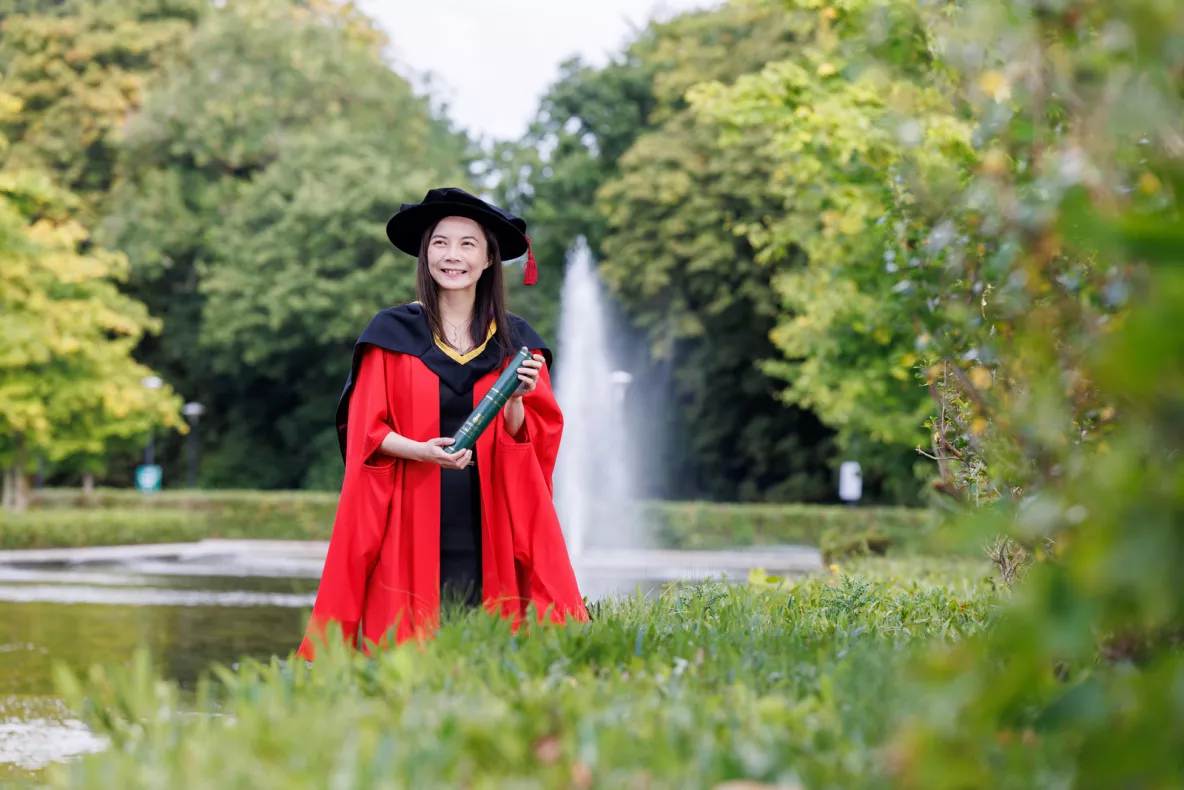
A music therapy graduate, praised for her work towards developing an innovative therapy service for new mothers, ended her time at University of Limerick on a high note this week as she was conferred with a PhD from the Faculty of Arts, Humanities and Social Sciences.
Dr Pui Sze Cheung, originally from Hong Kong, completed her PhD research in the area of using music therapy in perinatal mental health services to improve maternal mental health and wellbeing. She joined over 3,600 students graduating this week as part of UL’s autumn conferrings.
Pui Sze’s dedication to this research is rooted in her lifelong passion for music. Having studied psychology at undergraduate level, she was keen to combine her degree with her love of music and pursue music therapy as a career; however, with no such course existing in her native country at the time, she opted to become a music teacher.
It wasn’t long before the “dream” of studying music therapy caught up with Pui Sze, and in 2014 she moved to Ireland with her husband. She studied jazz and contemporary music performance in Dublin’s New Park Music Centre, enthusiastic at the opportunity to continue her education at the prestigious Berklee College of Music in Boston at the end of the two-year programme.
During that time, Pui Sze says, she became aware of UL through conversations with her peers, who frequently referenced the prestige of the Irish World Academy of Music and Dance. While she had applied to study music therapy at Berklee and had successfully secured a place on a scholarship, she embraced curiosity and the lure of UL.
“At the time, I thought ‘OK, since I’m applying and doing auditions, why don’t I go for the course in Limerick as well?’ So, when I finished the music course in 2016, I applied for the MA in Music Therapy at UL,” she recalls.
Pui Sze found herself in the fortunate position of having to choose between Berklee and UL, and, in the end, Limerick won out.
“When I came to UL, I thought the environment was really nice and the programme seemed very rich – there were a lot of opportunities,” she says.
It was during her MA that Pui Sze was first introduced to the concept of using music therapy to support mothers. Her thesis focused on the use of music during childbirth, and she worked with parents on designing bespoke playlists to support them through the pain, stress and anxiety experienced during the process.
The research project was illuminating to Pui Sze, who recognised there was “a lot of potential for using music in supporting new parents”. After hearing first-hand of the mental health needs of mothers and their support systems during the perinatal period, and the lack of literature on the role of music therapy in addressing those needs, Pui Sze chose to develop her research further through a PhD.
Supported by supervisors Dr Tríona McCaffrey (Irish World Academy of Music and Dance, UL) and Dr Sylvia Murphy-Tighe (Department of Nursing and Midwifery, UL), along with Dr Mas Mahady Mohamad, Consultant Psychiatrist with the Specialist Perinatal Mental Health Team (University Maternity Hospital Limerick/UMHL), Pui Sze developed a pilot study to explore the impact of a six-week music therapy programme with a small group of women attending the Specialist Perinatal Mental Health Services at UMHL.
The research results were “promising” and “encouraging”, Pui Sze says.
“[The pilot] has clinical significance; every mothers participating in music therapy had significant improvement in the levels of anxiety, mental wellbeing, and prenatal attachment.”
The significance of Pui Sze’s PhD research has also been acknowledged at government level, receiving funding for its continuance through the Women’s Health Fund. Up to €1.9 million was pledged to this fund by the Department of Health in 2022, following consultation with the Health Service Executive, for the development of services to support women and girls.
For Pui Sze, the next step will be to develop and scale up the research project nationally and, she hopes, internationally.
“This kind of service doesn’t exist at all in Ireland. Even in the UK, I don’t think there is that particular service, with perinatal health,” she says.
The dream, for Pui Sze, would be to see music therapy for perinatal mental health rolled out as a service in Ireland and further afield, making a tangible difference to the lives of new mothers and their families, as well as practitioners.
“When you work with the pregnant population, there is so much potential and you can see how a very tiny change for the mother can mean so much for the family and have so much impact for the long-term development of both the parents and the children. I just really love this kind of work,” she says.
Looking back on her time at UL, PuiSze – who was the recipient of several scholarships, including the Stepping Stone Scholarship for non-EU students – says the support she received during both her MA and PhD made her dream into a reality.
“I wouldn’t have been able to pursue the MA/PHD without this support … I am forever grateful for the opportunities and support that the Irish World Academy of Dance has given me.”